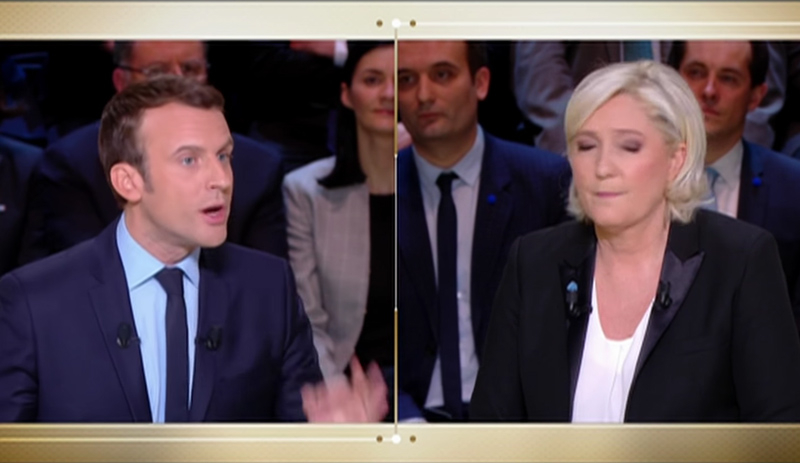The French presidential race is the latest election to shake up establishment politics. The Parti Socialiste and Les Républicains, who have been calling the shots for the past forty years, were voted out of the race. The “remainers” are Emmanuel Macron, a clone of Canada’s Prime Minster Justin Trudeau; and Marine Le Pen, whom many believe will not win.
France is a fractured country. As in the US and the UK, the rift is not between the traditional left and right. Instead, it reflects divisions — cultural, social, and economic — that came with globalization and mass migration. A map released by the Ministry of the Interior after the first round of the presidential campaign illustrates the new political scenery.
Blue represents the parts of France where Le Pen heads the list; pink, the areas supporting Macron. The blue areas coincide with old industrial areas, deeply damaged by globalization and industrial relocation. Many blue-collar workers are on welfare; and the antagonism between Muslims and non-Muslims is high. People who voted for Le Pen seem to feel not only that they lost their jobs, but that they are becoming foreigners in their own country.
The areas in pink (Macron), represent the big cities and places where the better jobs are. It also represents the areas where the “upper classes can afford to raise invisible barriers between themselves and the ‘other’, immigrants or minorities,” explains Christophe Guilluy, geographer, and author of Le crépuscule de la France d’en haut (The Twilight of Elite France).
The result of this mess is that France as one country no longer exists. One half the population (in blue-collar areas, small towns and rural areas) is shut out by the other half of the population (white-collar workers) who live in the big cities.
Guilluy adds:
“The job market has become deeply polarized and mainly concentrated in big cities, squeezing out the middle classes. For the first time in history, working people no longer live in the places where jobs and wealth are created.”
…
“But social issues are not the only determinant of the populist vote. Identity is also essential, linked as it is to the emergence of a multicultural society, which feeds anxiety in working-class environments. At a time of fluctuating majorities and minorities, amid demographic instability, the fear of tipping into a minority is creating considerable cultural insecurity in developed countries. Unlike the upper classes, who can afford to raise invisible barriers between themselves and the ‘other’ (immigrants or minorities), the working classes want a powerful state apparatus to protect them, socially and culturally. So, the populist surge is re-activating a real class vote.”
The question is if frustration and anger against globalization and immigration will succeed in electing Le Pen.
This frustration was not made lighter by the abysmal level of the debate. During the presidential campaign, the media focused only on political scandals: the presumed “fake job” offenses committed by François Fillon. Week after week, other presumed “political scandals” were continually released against him by a satirical weekly, Le Canard Enchaîné. Organized or not, these allegations overtook any discussion about the real problems in France: the extraordinary proportion of people on welfare, for instance. France’s unemployment rate stands at 9.9% (compared to 3.9% Germany and 4.7% in Great Britain); French GDP growth is one of the weakest of eurozone (1.1% vs 1.7% for eurozone, and 1.9% for EU); and France’s public debt, which accounted for 89.5% of GDP in 2012, is expected to reach 96% of GDP in 2017.
Most of all, the “French Islamist problem” remained undebated and unchanged. After two years of continuous terrorist attacks, after five years of continuous Muslim immigration, after dozens of Muslim riots, big and small, in the suburbs of big cities, millions of French people were expecting a change — or at least a public conversation. But, intentionally or not, these questions were avoided by the media.
The expected victory of Emmanuel Macron — a perfect product of the French techno-sphere — dashes any hopes of addressing the frightening questions of Muslim immigration; Muslim no-go-zones (more than a hundred); the spread of Salafism among Muslim youths, and of the general secession of the French Muslim community.
Macron, young and modern, cautiously avoided talking about these problems. Macron, for many analysts, is the candidate of the status quo: Islamists are not a problem and reforming the job market will supposedly solve all France’s problems.

French presidential candidates Emmanuel Macron (left) and Marine Le Pen. (Image source: LCI video screenshot) |
The results of the first round on April 23 showed that roughly 45% of the votes cast were motivated by protest and anger against globalization and dilution of the French nation’s sovereignty inside the European Union. The leftist populist Jean-Luc Mélenchon (19% of the voters) refused to endorse Macron in the runoff.
Inside Les Républicains, the big party loser of the first round, no one knows if a significant percentage might turn to Le Pen.
On May 7, more than 228 years after the French Revolution, the destiny of France may be seriously different — and whatever the result of the presidential election, possibly not for the best.
Yves Mamou is a journalist and author based in France. He worked for two decades for the daily, Le Monde, before his retirement.
























